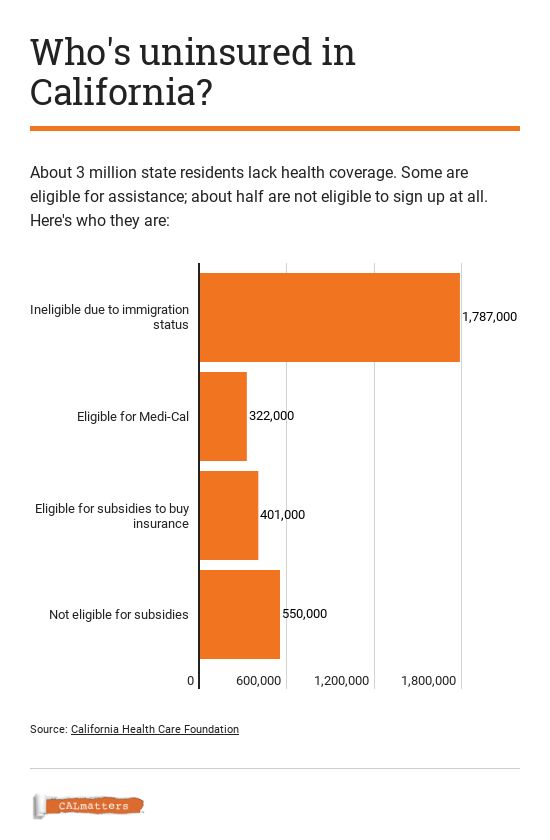|
County of Santa Clara Moves Forward with Purchase of Hospitals
|
On January 30, the U.S. Bankruptcy Court in Los Angeles denied a request from the California Attorney General to block Santa Clara County's purchase of O'Connor Hospital, Saint Louise Regional Hospital, and DePaul Health Center. Barring an appeal by the Attorney General to his dismissed stay order, this action allows the County to complete the transaction and continue offering critical healthcare services in these hospitals. The Verity Health facilities in Santa Clara County will be owned by the County and will be operated as community hospitals with appropriate local control by the physicians at the hospitals and by local administrators. (Read: County Press Release, 1/30/19; MountainView Voice, 2/3/19)
|
|
|
|
Covered California: Drop in New Consumers Signals Need to Restore Penalty
|
Covered California announced that 1.5+ million consumers selected a health plan for 2019 coverage during the recent open-enrollment period, a figure in line with last year's total. There was a 7.5% increase in the number of existing consumers renewing their coverage and a 23.7% drop in the number of new consumers signing up for 2019. "The federal removal of the individual mandate penalty appears to have had a substantial impact on the number of new consumers signing up for coverage," said CoveredCA Executive Director Peter V. Lee. CoveredCA conducted analysis and has released an issue brief, Covered California 2019 Open Enrollment: Early Observations and Analysis, that examines its open enrollment plan-selection demographic compared to last year. CoveredCA found larger differences in the share of Bronze consumers, unsubsidized consumers, and those populations in which English is not the preferred spoken language. However, other demographics do not appear to be a factor. (Kathy Keeshen, Bay Area)
|
|
|
|
El Camino Hospital Noted for Transparency Efforts in Modern Healthcare
|
A recent Modern Healthcare article, Hospitals vary in publishing CMS chargemaster prices, reports on the new CMS requirement that hospitals must now publish their list of retail charges for individual services and diagnosis-related groups in online spreadsheets. MH notes that officials at hospitals, such as El Camino Hospital in Mountain View, CA, that have invested in online tools allowing patients to get reliable estimates of how much they would pay out of pocket for various services, hoped publicity about the new sticker prices would draw attention to their more consumer-friendly transparency efforts. Regarding this matter, El Camino's Michelle McGowan remarked to ABL: "ECH has had a policy of transparency from the beginning - we are a public hospital and we strive to make sure that each patient knows the likely cost of service. The new system allows accurate and timely information to help inform the consumer before they receive a service - better for them and better for us." (Michelle McGowan & Cecile Currier, Silicon Valley)
|
|
|
|
Center for Elders' Independence Presents Dinner Event
|
On the evening of February 5, the Center for Elders' Independence will present its 5th Annual Eldership Dinner, which will include networking, a light dinner, a tour of CEI's San Leandro location, and the chance to participate in a guided discussion on aging with renowned aging and elder care expert, Nader Shabahangi. (Linda Trowbridge, Bay Area)
|
|
|
|
ElderConsult Announces Upcoming Dementia Conference 2019
|
On March 20, in Emeryville, ElderConsult Geriatric Medicine will hold its Living In the Moment - Dementia Conference 2019; Dementia Challenges: The Journey, Pain and Family Dynamics, a conference for families and elder care professionals. Among the presentations, Elizabeth Landsverk MD will discuss the challenges of behaviors in dementia and the steps to take to determine the cause and relieve the suffering of the person with dementia - without Ativan, sleeping pills - and work to keep them as engaged and independent as possible. Also, on February 13, in Menlo Park, Elizabeth will hold How to Talk to Your Doctor, where she'll discuss advocating for yourself, loved one, resident or client in order to receive the best possible care. (Elizabeth Landsverk MD, Bay Area)
|
|
|
|
Felton Institute Completes Pilot Program for Transitional Age Youth
|
Felton Institute recently celebrated the completion of "Welcome to My World," a 12-week multi-disciplinary arts pilot program collaboration between Felton's Teenage Pregnancy and Parenting Program, Full Vision Arts Foundation, and Young Family Resource Center. The program's objective was to engage Felton clients who are transitional age youth and provide them with positive means of self-expression and creative options for problem solving, conflict resolution, and coping skills. (Al Gilbert, Bay Area)
|
|
|
|
GeBBS on Modern Healthcare's List of Largest Revenue Cycle Management Co's
|
GeBBS Healthcare Solutions is #14 on Modern Healthcare's current list of the nation's 20 largest revenue-cycle management (RCM) companies. The list recognizes the nation's top RCM companies ranked by total number of contracts in 2017, and includes firms that have dedicated practice areas and staff to address the needs of the healthcare revenue cycle process. This marks GeBBS's third year on the list. (Nitin Thakor, Los Angeles)
|
|
|
|
HCI Reports Rise of Health Coaching Jobs Within Healthcare Organizations
|
In its recent article - Health Coaching Jobs on the Rise Within Healthcare Organizations, Health Coach Institute shares that health coaching was a $6 billion market in the U.S. in 2017 - an increase of 15% from 2014, and that there are about 109,000 health coaches working to advise and educate clients. Also, a growing number of healthcare organizations are now recruiting health coaches to help them facilitate actionable, sustainable health behavior change in rising and high-risk populations, across a continuum of delivery platforms, according to a 2018 study conducted by the Healthcare Intelligence Network. (Eric Neuner, Bay Area)
|
|
|
|
HumanGood Opens Low-Income Senior Housing in South San Francisco & Silicon Valley
|
HumanGood recently opened its newly developed Rotary Terrace, an 81-unit residence for low-income seniors, located in South San Francisco, developed in partnership with the South San Francisco Rotary Club. It joins the HumanGood family of affordable housing communities, currently totaling 59 located throughout California and in Washington State. Also, another HumanGood affordable housing community - 208-unit Life Garden - recently celebrated its grand re-opening in Sunnyvale, California, following its two-year renovation project. (Tara McGuinness, Bay Area)
|
|
|
|
Kaiser Permanente Helps Fund Affordable Housing & Receives Civic Honor
|
Kaiser Permanente announced that it spent $5.2 million to help acquire a 41-unit apartment complex in East Oakland as part of the healthcare giant's new effort to keep and expand affordable housing. Kaiser also said it plans to house 500+ homeless people in the city, age 50+ and with chronic health problems, plus create a $100 million loan fund to preserve affordable housing projects in places across the country where it operates. Meanwhile, Community Partners recently presented an Albert R. Rodriguez Civic Legacy Honor to Kaiser Permanente Southern California in recognition of its strong partnership and community health work with the organization. The award acknowledges spirited dedication to ethical integrity, public accountability, and fiscal prudence. (Walt Meyers, Bay Area)
|
|
|
|
King & Spalding Named a Law Firm of the Year + Announces Webinar, Conference & Article
|
Law360 has named King & Spalding (K&S) a "2018 Law Firm of the Year" for earning seven of its "Practice Group of the Year" recognitions, including in Health Care and Life Sciences. K&S was also one of four firms earning Law360's "Firms that Dominated in 2018" distinction. Meanwhile, K&S will present a webinar on February 27: Strategies for Challenging Health Plan Policies That Impact Coverage and Reimbursement. And, K&S's 28th Annual Health Law & Policy Forum will take place March 18, in Atlanta.
Also, Marcia Augsburger has written an article, Judge Grants Summary Judgment in Favor of OCR for HIPAA Violations Ordering a Texas Cancer Center to Pay $4.3 Million in Penalties, in which she discusses an administrative law judge's ruling that the U.S. Department of HHS and its Office for Civil Rights properly imposed penalties against MD Anderson Cancer Center for failing to encrypt laptops and USB thumb drives, in violation of HIPPA. (Marcia Augsburger, Bay Area, & Travis Jackson)
|
|
|
|
KMD Architects Anticipates New Behavioral Health Hospital's Opening
|
KMD Architects recently celebrated the open house of Wellfound Behavioral Health Hospital, in Tacoma, WA, a new facility built in collaboration with MultiCare Health System, CHI Franciscan Health, CBRE, and BN Builders. Expected to open to patients in March, 120-bed Wellfound will greatly improve access to adults needing inpatient mental healthcare and improve bed availability, nearly doubling the average bed capacity per 100,000 residents in the region. (Rob Matthew, Bay Area)
|
|
|
|
MYnd Analytics & Emmaus Life Sciences Announce Merger/Spin-Off
|
MYnd Analytics, Inc. recently entered into a merger agreement with Emmaus Life Sciences, a leader in sickle cell disease treatment, whereby Emmaus will become a wholly owned subsidiary. However, it's anticipated that the surviving company will change its name to Emmaus. In connection with the transaction, MYnd Analytics intends to transfer all of its assets and liabilities into its wholly-owned subsidiary, MYnd Analytics California, which is expected to commence trading as an independent company following the spin-off. MYnd Analytics California intends to continue operating, integrating and growing its technology-enabled telepsychiatry and teletherapy businesses in order to provide enhanced access to behavioral health services, improve patient outcomes, and help lower the costs associated with behavioral health issues. (George Carpenter, Orange County)
|
|
|
|
Nelson Hardiman's Harry Nelson Writes Book on Opioid Crisis
|
|
|

Harry Nelson, of Nelson Hardiman, was recently interviewed on Gurvey's Law, on KABC Radio, where he discussed his beginnings in healthcare law and his latest book, The United States of Opioids: A Prescription for Liberating a Nation in Pain. Harry's book will be released in March; pre-order now at harrynelson.com. In addition, Harry was recently interviewed by Eileen Drage O'Reilly with Axios about his thoughts on a new phone app developed to reduce the number of opioid overdose deaths by using sonar to detect symptoms and urgently message family, friends or emergency responders. (Harry Nelson, Los Angeles)
|
|
|
|
NorthBay Healthcare Lauded for Stroke & Cardiac Care
|
NorthBay Healthcare recently earned The Joint Commission's Gold Seal of Approval and the American Heart Association/ American Stroke Association's Heart-Check mark for Advanced Certification for Primary Stroke Centers. NorthBay underwent a rigorous onsite review in October to earn this recertification. And, the American College of Cardiology has again recognized NorthBay for its expertise and commitment in treating patients with chest pain, awarding it Chest Pain Center Accreditation with Primary PCI. The accreditation is based on rigorous onsite evaluation of the staff's ability to evaluate, diagnose, and treat patients who may be experiencing a heart attack. (Elnora Cameron, Bay Area)
|
|
|
|
On Lok to Launch Dementia Care Center & Services for LGBTQ Elders
|
On Lok's Montgomery Dementia Care Center will open in spring 2019 at 1000 Montgomery Street in San Francisco, its first day center focused on specialized dementia care. The 2,000-square-foot Center will welcome 16 seniors enrolled in On Lok's Program of All-inclusive Care for the Elderly (PACE), and will also offer dedicated resources and support services to caregivers of family members with dementia. Meanwhile, San Francisco's Openhouse and On Lok are co-designing a program that addresses two critical issues in the LGBTQ community: accessing much-needed aging services, and ameliorating the LGBTQ elders' fears that life in a nursing home would drive them back into the closet. A recent Aging Today article interviews On Lok's Grace Li and Openhouse's Karyn Skultety about the partnership. (Grace Li, Bay Area)
|
|
|
|
OneLegacy Announces Record-High Organ Donations
|
Tom Mone reports that his non-profit organization, OneLegacy, set a new record for organ donors in 2018: 515, up from the prior year and previous high of 487. Total organs transplanted was 1519, founded on a record-high donation authorization rate of 78% - reflecting the increase in donor registration at the DMV, as well as family support for donation. (Tom Mone, Los Angeles)
|
|
|
|
PreludeDx's DCISionRT Examined in Downloadable Webcast
|
A recorded webcast is available for download, featuring PreludeDx Founder & CSO along with leading breast cancer experts, reviewing the latest predictive data supporting Prelude DCISionRT and discussing how DCISionRT is changing the way DCIS is managed today. The study presented showed that when using traditional clinical pathologic factors, 59% of the low-risk patients would have benefitted from radiation therapy (RT), while 29% of the high-risk patients would not. The doctors felt that this test helped patients feel more confident about their RT decision because it was personalized to them and not just in general. (Dan Forche, Orange County)
|
|
|
|
SAVI Group Shares "Everything You Need to Know" About RCM
|
In its continuing blog series, SAVI Group provides information on understanding and effectively utilizing RCM solutions. Recent posts include: "Revenue Cycle Management: Everything You Need to Know;" "Ways to Supercharge Your Medical Practice Revenue in 2019;" and "The New Age of Medical Billing: Outsourcing." (Sumit Mahendru, Orange County)
|
|
|
|
Select Data Offers Prep Tips for Upcoming Patient-Driven Groupings Model
|
In Prepping for PDGM - PPS final rule increases agencies' payments for 2019, finalizes PDGM, Select Data urges Medicare-certified home care agencies to begin now to prepare for the January 1, 2020 transition to a Patient-Driven Groupings Model. The proposed model is intended to remove current incentives to over-provide therapy services and changes the 60-day episode of care unit of payment to 30 days. Also, a new set of groupings for the patient - diagnosis and functional levels - will be introduced that determines the patient's reimbursement for the new 30-day episode. Select Data discusses several areas home care agencies should focus on in order to prepare. (Ed Buckley, Orange County, & Ted Schulte, Los Angeles)
|
|
|
|
Share Our Selves Spotlighted in Forbes Article
|
A recent Forbes article on organizations nationwide that will gladly accept donations of personal care items such as extra hotel toiletries featured Share Our Selves, noting it as a health center which provides resources to the Orange County community. Medical care, dental care, social services, and behavioral healthcare are some of the offerings provided to those in need - primarily homeless and low-income individuals and their families. Hygiene products and toiletry donations are accepted, and travel-sized items are especially encouraged. Donations can be dropped off during business hours at SOS's Costa Mesa location. (Karen McGlinn, Orange County)
|
|
|
|
Solano County Providing Free Blood Pressure Monitoring Program
|
The Solano County Department of Health and Social Services, Public Health division has launched a free program that lets community members borrow a blood pressure monitoring kit from any County Library branch with their library cards. Educational materials accompany the kits, such as learning how to use the adjustable blood pressure cuff, understanding the blood pressure numbers, communicating concerns with their healthcare providers, and a wallet-sized booklet to record blood pressure numbers. (Mike Stacey, Bay Area)
|
|
|
|
WISE Healthcare Partners with OCHIN's California Telehealth Network
|
WISE Healthcare and OCHIN, a nonprofit community-based healthcare IT collaborative which operates the OCHIN California Telehealth Network (CTN), have joined forces to provide WISE technology services to OCHIN clients, bringing the best of eConsult, telemedicine, workflow engineering, and implementation to rural and underserved communities in the counties of Los Angeles, Riverside, San Bernardino, Ventura, and San Diego. WISE will also become a trusted partner in OCHIN/CTN's ongoing research and evaluation of healthcare redesign. Together, this work aims to fundamentally improve and transform the delivery of care for vulnerable patients. (Sajid Ahmed, Los Angeles)
|
|
|
|
TECH MEMBERS' HEALTHCARE NEWS
|
|
Easy Breathe Offers First-Ever Colored CPAP Tubing
|
Easy Breathe has announced the availability of one-of-a-kind colored Ultra CPAP Tubing, which are manufactured in the U.S., and universally compatible with all CPAP and BiLevel machines. Also, Easy Breathe has published an article - Study: CPAP Reduces Migraine Intensity and Burden - which reports on a study that showed a decrease in the frequency of migraines among sleep apnea patients who underwent CPAP treatment, as well as a reduction in duration and intensity, and a decline in reliance on medication to treat their migraines. (Nick Weiss, West Los Angeles)
|
|
|
|
PCIHIPAA Chosen by SmartPractice & MedPro
|
PCIHIPAA has announced two recent partnerships - with SmartPractice, a provider of quality support, tools and products to optimize dental quality of care, patient production and revenue; and with MedPro, a leader in waste management disposal services - in order to protect these companies' clients from the onslaught of HIPAA violations, which include ransomware attacks and data breaches, that are impacting medical and dental practices throughout the U.S. (Jeff Broudy, West Los Angeles)
|
|
|
|
Tanner Research CEO to Present "Dinner and Movie Night"
|
On the evening of February 7, John Tanner, CEO of Tanner Research, Tanner Care Health and Wellness Center, and NuSci, will present a Dinner and Movie Night, featuring the film, "Forks Over Knives," which examines the profound claim that most, if not all, of the degenerative diseases that afflict us can be controlled, or even reversed, by rejecting animal-based and processed foods. Attendees will view and discuss the movie, and enjoy a healthy, plant-based meal in an informal setting, with convenient free parking. More information. (John Tanner, Monrovia)
|
|
|
| |


 At the crossroads: Social Determinants of
At the crossroads: Social Determinants of 

